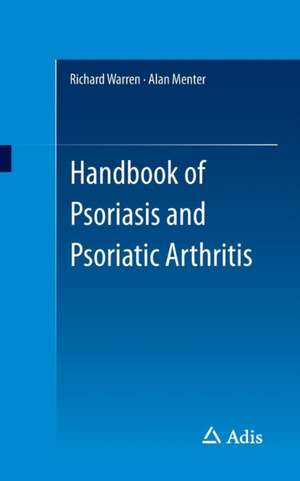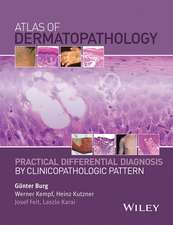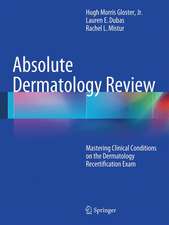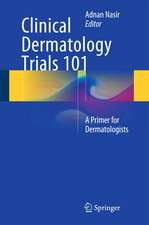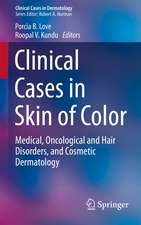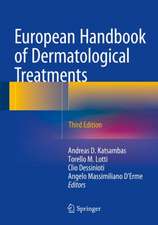Handbook of Psoriasis and Psoriatic Arthritis
Editat de Richard Warren, Alan Menteren Limba Engleză Paperback – 29 ian 2016
Preț: 568.41 lei
Preț vechi: 598.32 lei
-5% Nou
Puncte Express: 853
Preț estimativ în valută:
108.78€ • 113.15$ • 89.80£
108.78€ • 113.15$ • 89.80£
Carte tipărită la comandă
Livrare economică 15-29 aprilie
Preluare comenzi: 021 569.72.76
Specificații
ISBN-13: 9783319182261
ISBN-10: 3319182269
Pagini: 80
Ilustrații: XI, 116 p. 10 illus., 7 illus. in color.
Dimensiuni: 127 x 203 x 12 mm
Greutate: 1.46 kg
Ediția:1st ed. 2016
Editura: Springer International Publishing
Colecția Adis
Locul publicării:Cham, Switzerland
ISBN-10: 3319182269
Pagini: 80
Ilustrații: XI, 116 p. 10 illus., 7 illus. in color.
Dimensiuni: 127 x 203 x 12 mm
Greutate: 1.46 kg
Ediția:1st ed. 2016
Editura: Springer International Publishing
Colecția Adis
Locul publicării:Cham, Switzerland
Public țintă
Professional/practitionerCuprins
Introduction.- Pathogenesis of psoriasis and psoriatic arthritis.- Clinical presentation of psoriasis and psoriatic arthritis.- Diagnosis and evaluation of psoriasis and psoriatic arthritis.- Treatment of psoriasis.- Treatment of psoriatic arthritis.- Quality of life in psoriasis.
Notă biografică
Richard Warren, MBChB, MRCP, PhD, is a Clinical SeniorLecturer and Honorary Consultant Dermatologist. He graduated from Liverpool Universitywith a first class honours degree in Pharmacology and gained his Medicaldegree, with honours, one year later. He was awarded The J Hill Abram prize –highest mark in Medicine; and the Reginald Dora Goodrick prize – highest markin Surgery. His work in Dermatology has focused on: pharmacogenetics (formingthe basis of his PhD thesis), the genetic susceptibility to psoriasis and morerecently biological therapies and their use in the treatment of psoriasis. Forhis work into the pharmacogenetics of methotrexate he has received national andinternational awards from the British Association of Dermatologists (BAD) andAmerican Academy of Dermatology. He is widely published in the field ofdermatology with numerous abstracts, papers and book contributions includingThe Lancet, Nature Genetics, and The Journal of Investigative Dermatology. Heis currently the EU Editor in Chief for the journal Dermatology and Therapy. Hehas been an invited plenary speaker at major national and international dermatologymeetings and is a member of The International Psoriasis Council. He currentlychairs the BAD guideline group for methotrexate and is a member of the BADbiologics committee and research subcommittee. In 2012, he was the expert panelmember on the National Institute for Health and Clinical Excellence guidelinegroup for psoriasis. He co-lead one of the two workstreams involved in therecent (2013) successful funding from the Medical Research Council stratifiedmedicine grant (value £7 million) – Psoriasis Optimisation of Relevant Therapies(PSORT). He coestablished a clinic for patients with severe psoriasis andpsoriatic arthritis in 2010 with Dr Hector Chinoy, which has received wideacclaim and is used as a national exemplar.
Alan Menter, MD, was born in England and is a graduate ofthe Medical School of the University of Witwatersrand, South Africa. Hecompleted his dermatology residency at Pretoria General Hospital at theUniversity of Pretoria, also in South Africa, and two fellowships in London atGuy's Hospital and St John's Hospital for Diseases of the Skin. A fellowship withthe University of Texas Southwestern Medical Center in Dallas brought Menter tothe United States. Since then, he has held several positions within the UT andBaylor University Dallas systems. In 1992, he was appointed Chairman of theDivision of Dermatology at Baylor University Medical Center and still holdsthat position. In 2007, he was appointed Director of the Baylor Research Centerand in 2010, Program Director of the newly formed Dermatology Residency Programat Baylor University Medical Center.
Dr Menter has a long-held interest in psoriasis andpsoriatic disease research. In 1994, he co-authored the first gene discoveryfor psoriasis, published in Science in 1994. His research on psoriasis hasexamined everything from ultraviolet phototherapy and biologic therapy to the mappingof genetic patterns to predict if a person is at risk of developing psoriasispharmacogenomics. In August 2004, Dr Menter helped found the InternationalPsoriasis Council to raise international awareness of psoriasis as a seriousautoimmune disease that can significantly impact quality of life. His clinicalpractice includes more than 1600 patients on systemic and biologic therapy.Dr Menter held the position of clinical director of theNational Psoriasis Foundation Gene Bank from 1996 to 2002. His resume listssome 300+ articles, four books and 19 book chapters. He serves as a member ofthe editorial board for several medical journals, including the Journal ofClinical Dermatology and Clinical and Experimental Dermatology. He is chair of researchfor Dermatology at Baylor Research Institute, as well as clinical professor ofdermatology at the University of Texas Southwestern Medical School in Dallasand professor at Texas A&M Health Science Center, College of Medicine. DrMenter has been listed in the Best Doctors in America since 1994 and Who’s Whoin Medicine and Healthcare since 1996. He also represented the South AfricanNational Rugby team, the Springboks, in 1968. In 2013, Dr Menter received theLifetime Achievement Award from the National Psoriasis Foundation. In March2015, he received the Dermatology Foundation annual Clark W. Finnerud award atthe American Academy of Dermatology 2015 meeting in San Francisco.
Alan Menter, MD, was born in England and is a graduate ofthe Medical School of the University of Witwatersrand, South Africa. Hecompleted his dermatology residency at Pretoria General Hospital at theUniversity of Pretoria, also in South Africa, and two fellowships in London atGuy's Hospital and St John's Hospital for Diseases of the Skin. A fellowship withthe University of Texas Southwestern Medical Center in Dallas brought Menter tothe United States. Since then, he has held several positions within the UT andBaylor University Dallas systems. In 1992, he was appointed Chairman of theDivision of Dermatology at Baylor University Medical Center and still holdsthat position. In 2007, he was appointed Director of the Baylor Research Centerand in 2010, Program Director of the newly formed Dermatology Residency Programat Baylor University Medical Center.
Dr Menter has a long-held interest in psoriasis andpsoriatic disease research. In 1994, he co-authored the first gene discoveryfor psoriasis, published in Science in 1994. His research on psoriasis hasexamined everything from ultraviolet phototherapy and biologic therapy to the mappingof genetic patterns to predict if a person is at risk of developing psoriasispharmacogenomics. In August 2004, Dr Menter helped found the InternationalPsoriasis Council to raise international awareness of psoriasis as a seriousautoimmune disease that can significantly impact quality of life. His clinicalpractice includes more than 1600 patients on systemic and biologic therapy.Dr Menter held the position of clinical director of theNational Psoriasis Foundation Gene Bank from 1996 to 2002. His resume listssome 300+ articles, four books and 19 book chapters. He serves as a member ofthe editorial board for several medical journals, including the Journal ofClinical Dermatology and Clinical and Experimental Dermatology. He is chair of researchfor Dermatology at Baylor Research Institute, as well as clinical professor ofdermatology at the University of Texas Southwestern Medical School in Dallasand professor at Texas A&M Health Science Center, College of Medicine. DrMenter has been listed in the Best Doctors in America since 1994 and Who’s Whoin Medicine and Healthcare since 1996. He also represented the South AfricanNational Rugby team, the Springboks, in 1968. In 2013, Dr Menter received theLifetime Achievement Award from the National Psoriasis Foundation. In March2015, he received the Dermatology Foundation annual Clark W. Finnerud award atthe American Academy of Dermatology 2015 meeting in San Francisco.
Caracteristici
Concise pocket book designed to support physicians, rheumatologists, and dermatologists in their day-to-day practice
Written by leading thought leaders and developed using the latest clinical evidence and guidelines
High quality full-color supportive illustrations, tables, and graphs enable complicated concepts to be made clear to readers with different levels of background understanding
Includes supplementary material: sn.pub/extras
Written by leading thought leaders and developed using the latest clinical evidence and guidelines
High quality full-color supportive illustrations, tables, and graphs enable complicated concepts to be made clear to readers with different levels of background understanding
Includes supplementary material: sn.pub/extras
